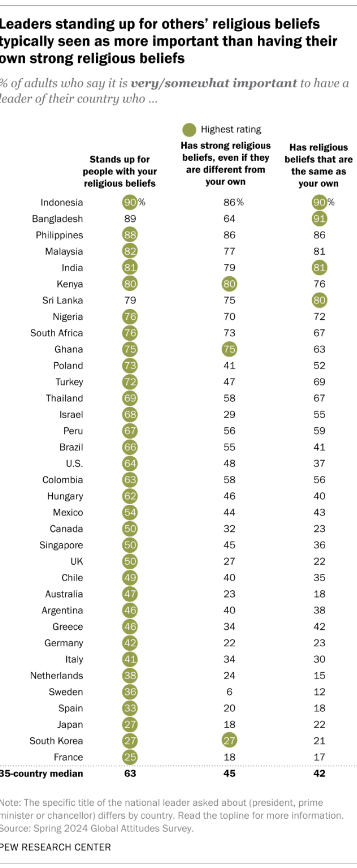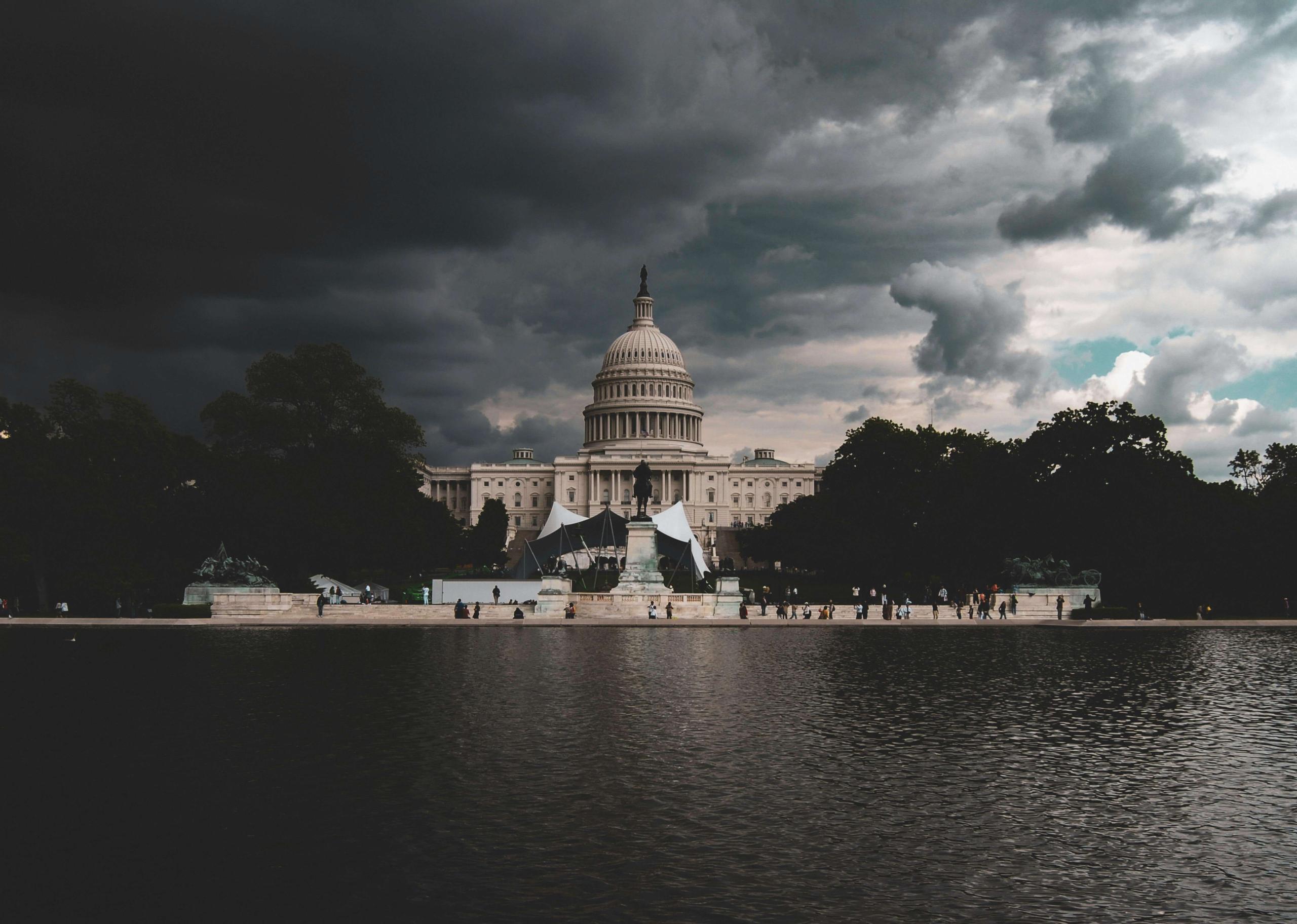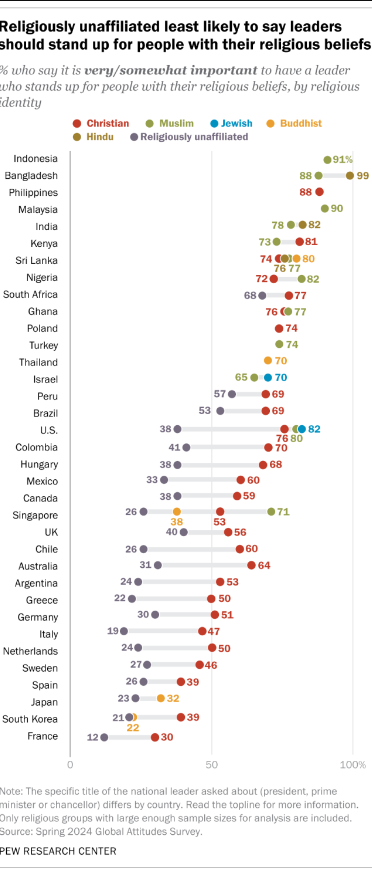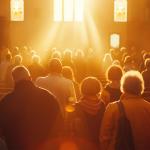In a recent study, Pew Research Council uncovered a note about the global population that contradicts popular sentiment in the states about people of faith, “We want our leaders to stand up for us and our beliefs in God.”
This past March, another Pew poll underscored America’s disinterest in religion as 80% of those surveyed believe “religion is losing influence in public life.” Only 49% of those U.S. adults say that’s a bad thing. As that disheartening number swells across the nation, this global study instills a refreshed sense of hope.
 While this poll represents people of faith in a broader sense of dogma, it can be a unifying way of life among global citizens. The poll shows countries known for holding a high sense of religion and faith, people in those countries want to see a country leader become a defender of faith as well.
While this poll represents people of faith in a broader sense of dogma, it can be a unifying way of life among global citizens. The poll shows countries known for holding a high sense of religion and faith, people in those countries want to see a country leader become a defender of faith as well.
Among Pew’s 35-country outreach for this study, a telling point of reference for religion around the world is people feel better voting for someone who stands up for others’ religious beliefs even more than someone who has their own religious beliefs.
The top countries that want someone with a strong foundation of giving a voice to the voiceless are places of high faith:
- Indonesia – 90%
- Bangladesh – 89%
- Phillippines – 88%
- Malaysia – 82%
- India – 81%
Although 87% of Indonesia is Muslim and India is 81% of India is Hindu, 79% of the Phillippines is Roman Catholic, which shows all major religions are comprised of people of virtue and a firm commitment to faith.
The top countries that want a leader with strong religious beliefs, even if they are different from their own are the following:
- Indonesia / Phillippines – 86% (tie)
- Kenya – 80%
- India – 79%
- Malaysia – 77%
- Ghana / Sri Lanka – 75% (tie)
The variety of religions among those diverse nations includes Islam, Roman Catholic, Christianity, Hinduism, and Buddhism. If the elected leader had the same religious faith as the voters, the resounding answer is still about the centrism of faith.
- Bangladesh – 91%
- Indonesia – 90%
- Phillippines – 86%
- Malaysia / India – 81% (tie)
- Sri Lanka – 80%
What Does This Nation Want Out of Its Leaders?

For people of faith in the United States, what we want out of our leaders doesn’t seem to be as clear as matters of religion and state. As Pew Research shared earlier this year:
- 64% of U.S. adults say it’s important to have a president who stands up for people who share the respondent’s religious beliefs.
- 48% say it’s important that a president has their own strong religious beliefs, even if the beliefs differ from those of the respondent.
- 37% say it is important for a president to have religious beliefs that are the same as the respondent’s.
 Global countries known for their vocal adherents stand firm and united on the issues of faith and how they prefer their leaders to act. In America, not so much, which could say something about how we vote in the first place.
Global countries known for their vocal adherents stand firm and united on the issues of faith and how they prefer their leaders to act. In America, not so much, which could say something about how we vote in the first place.
Ironically, America has voted a self-avowed man of faith into the White House every election since Woodrow Wilson in 1913. (Before that, William Howard Taft was a Unitarian, a sect most Christians don’t believe has the same values as the Bible.)
Although a commitment to Christian faith isn’t nearly what it was at the turn of the 20th century, the fact America has voted for a person with a professed faith in God for more than a century. During the 2024 election, both candidates express their faith in God.
Kamala Harris was raised in a Baptist church despite her mother being Hindu. Trump relies on people of faith nationwide despite not attending church at all. Does it make a huge difference en route to that colonial pearl house at 1600 Pennsylvania Avenue?
Looking at the numbers in this country, that doesn’t matter. Yet, looking at the facts, it matters quite a bit.
If someone is raised around religion, the beliefs of their leadership (i.e., elected officials, boss at work, parents or guardians) reflect those that earn their vote. Another poll from Pew Research shows the “religiously unaffiliated are least likely to say leaders should stand up for people of faith.”
There is probably no wider gap in adherence to faith among voters than in America with 38% of “religiously unaffiliated” saying having a person of faith in charge would sway a vote while 76% of Christians and 82% of Jewish believers feel the same.
Democracy cannot succeed unless those who express their choice are prepared to choose wisely. The real safeguard of democracy, therefore, is education.
-Franklin D. Roosevelt, U.S. President (1933-1945)
If education is the silver bullet of a democracy, is America in need of reloading? Do they bring an empty chamber of insight to the polls? Depending on the targets in November, we’ll see how we compare our global brothers and sisters.


